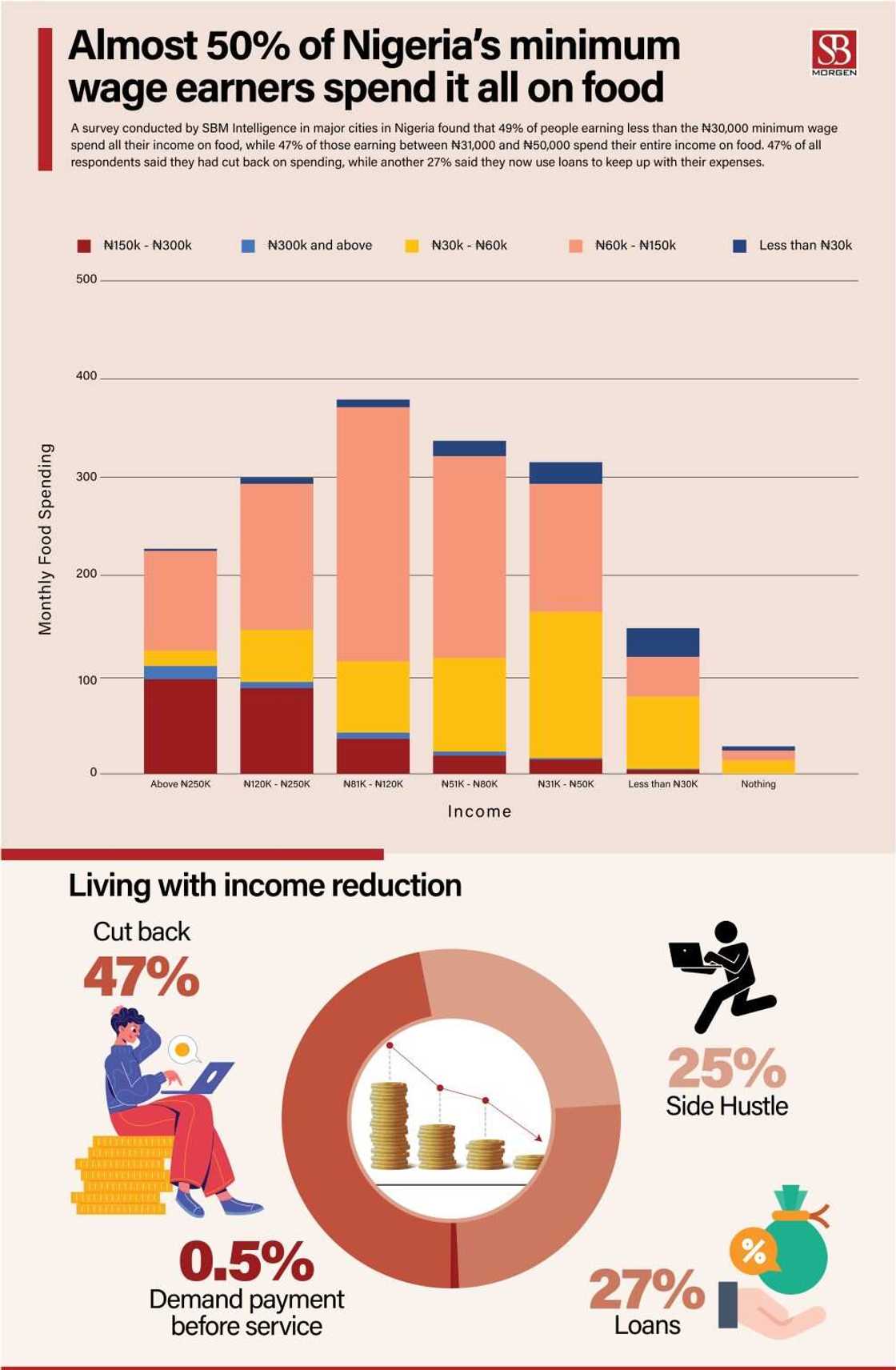Almost 50% of Nigerian Minimum Wage Earners Spend Entire Income on Food
- A new report has shown that half of minimum wage earners in Nigeria devote all their income to food
- The findings indicate that those in this wage bracket struggle to keep pace with the country's inflation
- Nigeria has grappled with various macroeconomic difficulties, which have led to decreased incomes for many Nigerians
Legit.ng journalist Victor Enengedi has over a decade's experience covering Energy, MSMEs, Technology and the stock market.
Around half of Nigerian workers who earn the minimum wage in the country allocate their entire income towards covering their fundamental food requirements.
This assertion was revealed in a survey conducted by SBM Intelligence, a Nigerian geopolitical intelligence platform, and published on their website to highlight Nigeria's escalating inflation and other macroeconomic challenges.
The findings indicated that those earning the minimum wage struggle to keep pace with the country's inflation, resulting in a situation where basic necessities like food are becoming progressively more costly while wages remain stagnant.

Read also
No more N25 billion: CBN to increase Nigerian bank recapitalization ahead of $1 trillion GDP target

Source: Youtube
Lingering food crisis in Nigeria
Nigerians have been contending with a notable surge in food costs, leading to a considerable proportion of the population's earnings being directed towards food expenditures.
The report provides insights that reveal a significant portion of minimum wage earners allocate their entire income toward food expenses, and many have resorted to reducing their spending or relying on loans to make ends meet.
The global economic environment has been characterised by instability in recent years, and Nigeria has yet to be immune to these challenges.
The report reads:
49% of people earning less than the N30,000 minimum wage spend all their income on food, while 47% of those earners between N31,000 and N50,000 spend their entire income on food. 47% of all the respondents said they had to cut back on spending, while another 27% said they now use loans to keep up with their expenses.

Read also
“Nigeria naira not as usual, setting up japa plans”: Nigerian banker earning 250k monthly laments
The country has grappled with volatile oil prices, inflation, and various macroeconomic difficulties, which have led to decreased incomes for many Nigerians.
It would be recalled that Nigeria's National Bureau of Statistics reported that the country's inflation rate in September rose to 26.72%, mainly driven by escalating food prices, marking a 0.92% increase compared to the previous month.
This is part of an ongoing trend where inflation rates have continued to climb, with each month setting a new record for the highest inflation rate.

Source: UGC
Nigerians allocate the highest percentage of income to groceries
The SBM Intelligence report closely aligns with a study published in August 2023 by Picodi Research, an international e-commerce organisation, indicating that Nigerians typically allocate around $62 (approximately N49,600 at an official rate of N800/$) monthly towards their food expenditures.
This level of spending positions Nigeria at the forefront in Africa for the highest food expenses among its residents.
Lanre Akinlami, a civil servant who resides in Lagos, admits to Legit.ng that because of the rising inflation, a great percentage of his salary goes to food.
He said:
To be honest, the salary is not even enough. If finishes even before the middle of the month. Food takes a good portion of my salary, and that is because food keeps increasing while salary stays the same.
50kg bag of rice hits N42,000 as FG mobilises $500 million for food in Nigeria
Meanwhile, Legit.ng reported earlier that the removal of petrol subsidies has led to a significant spike in food prices, particularly for staples like rice in Nigeria.
Investigations conducted by Legit.ng highlight a substantial increase in the cost of rice, a dietary staple, over the past two weeks in June.
Surveys indicate that traders have further elevated rice prices in numerous markets, attributing the escalation to various factors, such as increased transportation costs, inflation, and border closures.
PAY ATTENTION: Unlock the best of Legit.ng on Pinterest! Subscribe now and get your daily inspiration!
Source: Legit.ng


